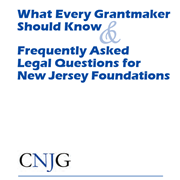Site Search
- resource provided by the Forum Network Knowledgebase.
Search Tip: Search with " " to find exact matches.

This guide was designed to help the state’s philanthropic community understand their ethical, legal, and fiduciary requirements and obligations.
This tool for unstaffed foundations includes an accountability self-assessment and a legal checklist. It is divided into nine topic sections, each of which is divided into three levels, which can help foundations tailor the tool to meet their specific interests and needs. Also included are an Excel spreadsheet to help tabulate responses, an extensive accountability resource list, and a glossary of key words and concepts used in the tool.
To answer the basic question of how many active family foundations are planning to spend down or exist in perpetuity (or have not yet made a decision), and to examine foundations’ motivations and decision-making, the Foundation Center, in collaboration with the Council on Foundations and with additional assistance from the Association of Small Foundations, launched a study of family foundations in 2008. This report presents the full range of study findings, which are based on survey responses from 1,074 family foundations.
